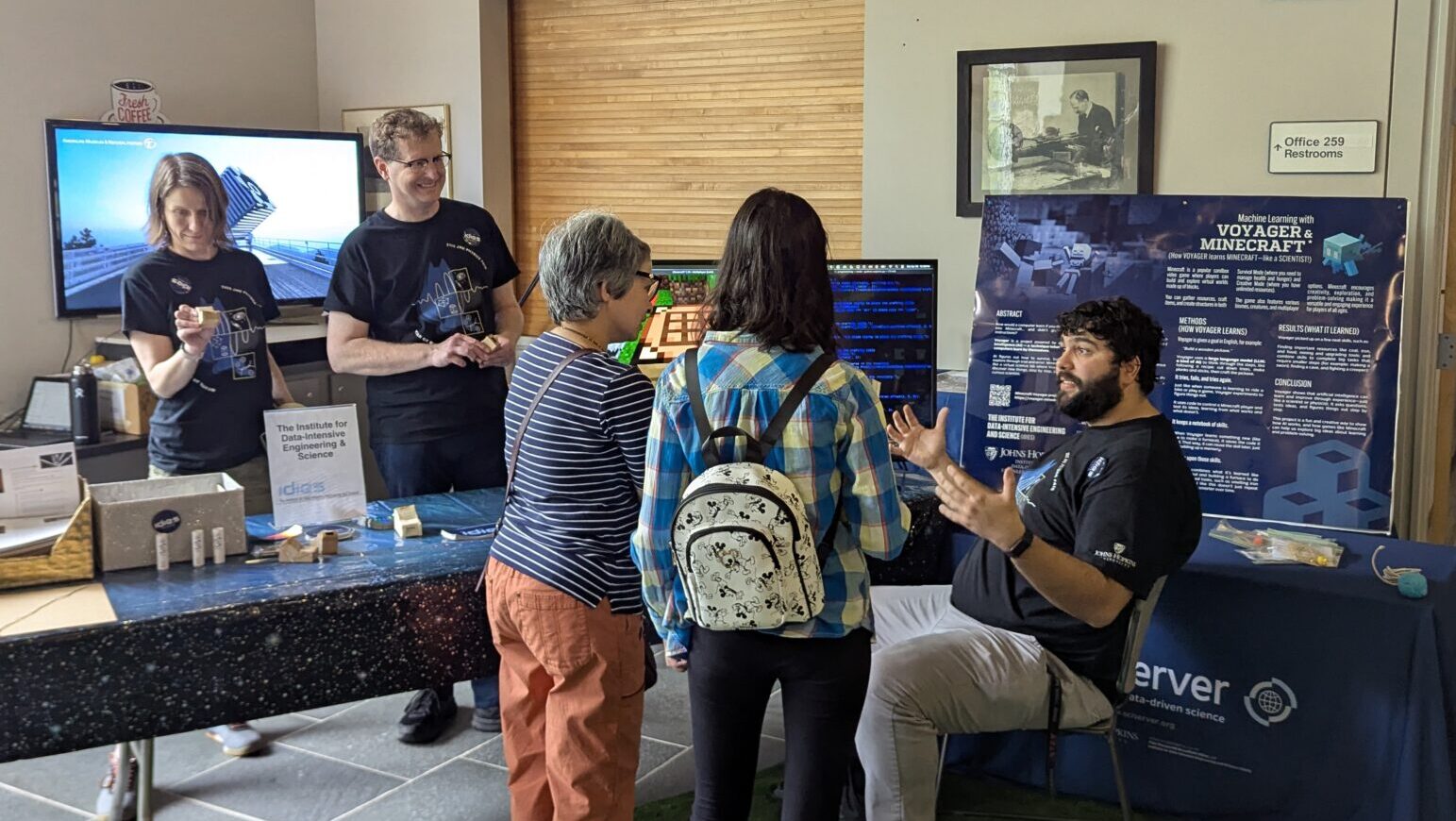Education
SciServer, the science platform—the flagship software offering of Ithe Institute ensures access to rich and diverse datasets—the same as those used by the academic research community—for students and the general public.
Students of all skill levels have the opportunity to explore science through the same datasets trusted, collected, and standardized by researchers, fostering a deeper understanding of and connection with scientific inquiry.
This also means that amateur big data enthusiasts can contribute to scientific advancements through citizen science initiatives, actively supporting research efforts as online volunteers.
Beyond hosting the data, our team of software developers, data scientists, and educators provide knowledge, tools and resources, both for SciServer and scientific investigation at a variety of events and appearances.
Below are some of the ways that we facilitate education and lead outreach efforts for big data enthusiasts everywhere.

Sloan Digital Sky Survey & SciServer

The Sloan Digital Sky Survey (SDSS) is a multi-epoch optical & IR spectroscopy covering the entire sky and offering contiguous integral-field spectroscopic coverage of the Milky Way and Local Volume galaxies.
Software engineers and astronomers at the Institute for Data-Intensive Engineering and Science (IDIES) originally created their flagship project SciServer—the Science Platform— for storing, accessing, and analyzing the Sloan Digital Sky Survey (SDSS) catalog data.
Many of the IDIES educational tools and offerings center around SciServer and the SDSS data therein.
Big Data in the Classroom (K-12)
The Institute for Data-Intensive Engineering makes its data available to students and teachers, with interactive standards-based lesson plans for teaching science, math, and technology at the middle school, high school, and college levels.
See the links below for the sites where the lesson plans are hosted.
SDSS: Voyages
SDSS Voyages offers engaging, data-driven astronomy activities designed for students of all ages and skill levels. Using real data from the Sloan Digital Sky Survey, students can explore topics ranging from nearby asteroids to distant quasars—just like professional astronomers.
The platform provides free, flexible resources that educators can tailor to their teaching needs. Activities are structured to support gradual learning, allowing students to move from basic concepts to more advanced, inquiry-based projects at their own pace. Advanced learners can even use these tools to launch their own investigations into the vast SDSS dataset.
Available Resources for Teachers Include:
- Sample lesson plans to help structure classroom activities
- A full catalog of Preflight, Launch, and Expedition activities with descriptions and teaching guides
- Links to U.S. national math and science standards
Voyages is designed to put students in control of their learning, with educators guiding and supporting their journey.
SkyServer & SkyServer Navigate
The SkyServer DR19 website is the public data portal for the Sloan Digital Sky Survey’s 19th Data Release (DR19). It provides access to one of the most comprehensive astronomical datasets ever collected, including images and spectra of millions of celestial objects. Users can explore the universe through interactive tools like Navigate, Explore, and Finding Chart, or perform advanced data analysis using SQL queries and cloud-based Jupyter Notebooks via SciServer integration. Designed for both researchers and educators, SkyServer also offers educational resources and tutorials to help users of all levels engage with real astronomical data.

Data Science and SciServer in Higher Education
SciServer is the flagship science platform and free computational resource provided and maintained by IDIES. SciServer provides users with persisting data storage, a collaborative environment, industry-standard programming packages, and the ability to leverage high-performance computational analyses—all for free and for anyone to use. Instructors may upload datasets for student and public use and create Jupyter notebooks with replicable data analyses tutorials in one of several programming languages.
Because SciServer is free and versatile, compatible with open-source data analyses software packages spanning disciplines from turbulence to pathology to oceanography to materials science, it can effectively replace costly required course materials, significantly reducing the financial barriers many students face.
While the platform was initially developed to fill a specific gap in big data management and analyses within the professional astronomy research community, SciServer has also become the ideal tool for teaching data science to higher education students of all skill levels.
Below are a few actual use cases of SciServer functioning as both an educational platform and a computational infrastructure. Select labs are available for download through the course instructors’ github repositories.
Courses using Python
Introductory astronomy
Astronomy 101 »
University of St Andrews, Scotland
Professor Rita Tojeiro, Ph.D. »
Rita’s GitHub repository »
Upper-level astronomy
Astronomy 420 »
University of North Carolina, Asheville
Professor Britt Lundgren, Ph.D. »
Britt’s GitHub repository »
Courses using R/Rstudio
Research in biology (genomics)
Biology 12 »
Clovis Community College, Fresno, California
Professor Rosa Alcazar, Ph.D. »
Course Details
Students in this course learn critical thinking and data analysis skills in the context of genomics, introducing them to basic skills in R/Rstudio and making use of Bioconductor bioinformatics software, widely used amongst researchers in the field.
At the end of the course, students also prepare and present posters on their work at the Annual Clovis College Research Symposium providing them with formal presentation experience relevant to research.
Those enrolled in this course become part of the Carnegie Massive Open Online Research (C-MOOR) Scholar cohort.
The C-MOOR program endeavors to close achievement gaps created by historical systems of inequity by connecting community college students with internship opportunities, career advising, university tours, and real-world lab experience.



